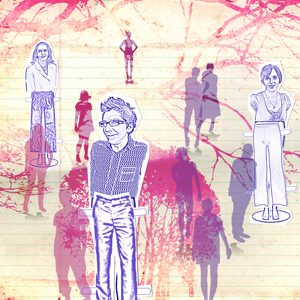These women aren’t afraid to expose themselves.
The Best Medicine
Uncomfortable situations plus humor equal accessibility. This is the equation that has guided Tania Katan to an internationally successful career incorporating comedy and breast cancer. Katan knows all about the latter, having survived the disease twice, once at age 21, and again 10 years later. “Being ill and solemn is a bit redundant,” she says. “If I weren’t able to see the absurdity, levity, comedy in my illness, then I would just grab a bottle of Jim Beam, a rusty razor blade, turn on Elliott Smith and end it all, you know?”
An awareness activist, Katan, now 37, can often be seen running topless in 10k breast cancer research fundraisers. She does this not for shock value, but as a visual reminder of why the runners are there in the first place. Lesbians, she notes, are among those who are most in need of a reminder to get checkups. “As far as lesbians and breast exams go, it’s our job to touch each other’s boobies,” she says. “I have no idea why women wouldn’t want to keep tabs on each other’s breasts.” Recently, European fans were enthralled with Katan’s solo performance, Saving Tania’s Privates, at the Scotland’s Edinburgh Fringe Festival. Rave reviews have led to talks about a possible film based on the show.
Without diminishing the severity of cancer, Katan says her illness hasn’t been all bad. “Having cancer two times before my 32nd birthday has offered me insight that most people my age don’t have access to,” she says. “There’s something freeing about knowing you can kick cancer’s ass a few times. It frees you up to live your life with more urgency, humor and love.” Be on the lookout for Katan’s newest book, which she is finishing this year.
Taking Control
Today, 26-year-old Lindsay Higgins is poised to graduate from Tulane Medical School in the class of 2009. It’s been quite the journey for Higgins, who, just 10 years ago, was outed in a journal entry that her mother read, and then was rejected by her suburban Chicago parents, who told her she was sick and needed help.
She was sent to a dozen different psychiatrists and psychologists, subjected to blood tests to check her hormone levels, and sent to a gynecologist to be certain nothing was “physically wrong.” From the age of 16 until her 18th birthday, Higgins was not allowed to leave home unless she was escorted by a family member and was not allowed to use the phone or the Internet, or to watch TV. Falling into a deep depression, Higgins contemplated suicide. Then, one day, she decided to get out. “I made a conscious decision to take control of my life and to stop allowing my parents to decide my worth or my fate,” she says.
Higgins put all her energy into starting the first GSA in her high school and, at 18, literally pushed her father out of the way, left home and, by working dozens of jobs, financed her undergraduate education while maintaining honors status at the University of Illinois at Urbana-Champaign. She then went on to Tulane as a recipient of a Point Foundation Scholarship.
While keeping med student hours, Higgins also managed to serve in numerous volunteer capacities, including two years with a hospice, and as an in-home care assistant for people with disabilities. Most recently, she helped to found Flambeaux, a New Orleans-based LGBT support group for the under-18 crowd, the first such group to organize since Hurricane Katrina. “I realize that I’ve benefited from many opportunities that others are not afforded, so, for me, it is also important to give back to the com-munity,” she says.
Strategist for Progress
After working for more than 10 years in health advocacy and political strategy at the Human Rights Campaign and eventually becoming vice president, Winnie Stachelberg has met her fair share of political heavy hitters. “I also traveled around the country meeting LGBT folks and listening to them share their stories,” she says. “I am truly lucky.”
Stachelberg also spent three years in the Office of Management and Budget as a career budget examiner in both the George H.W. Bush and the Clinton administrations. “I learned so much about the federal government, healthcare policy and how D.C. works, or doesn’t,” she says of her time there.
She eventually went on to join the Center for American Progress, a progressive think tank started by John Podesta, President Obama’s transition team leader. The group’s goal is to help refocus national attention away from security issues and onto education, healthcare, the economy and energy policy. As senior vice president for external affairs, Stachelberg takes people’s ideas and helps to inject them into the political debate—turn them into action and policy.
Lesbians, she says, face unique hurdles, especially during tough economic times. As debates heat up, lesbians must be a part of the conversation too, she says.
